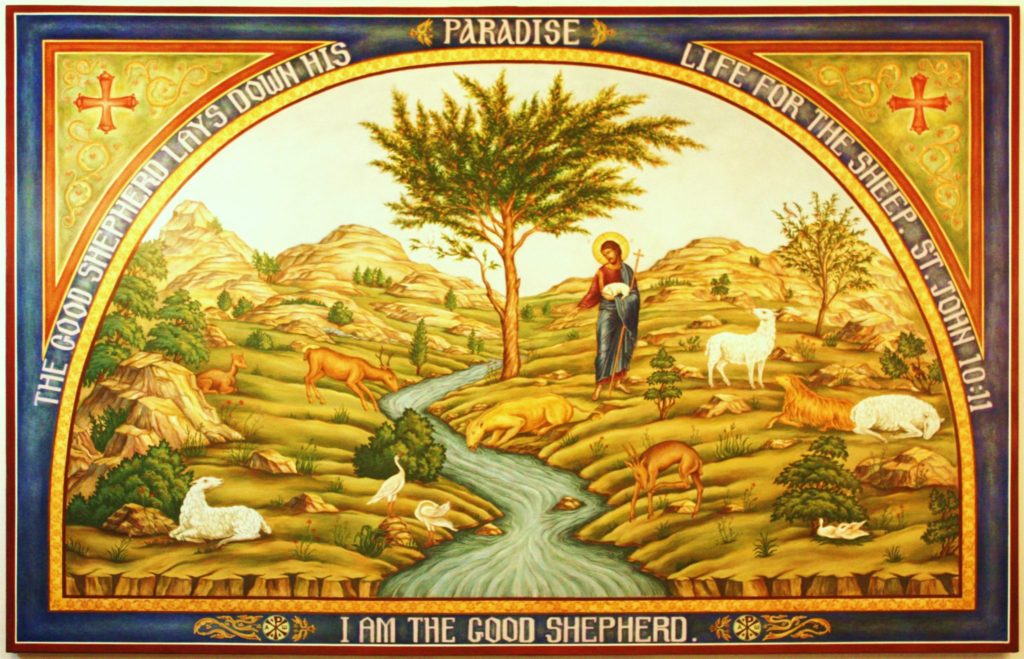Friday of the Seventh Week of Pascha; Leave-taking of the Ascension of the Lord
You can listen to an audio podcast of this commentary at https://www.spreaker.com/user/youngfaithradio/pascha7fri
In today’s Gospel, we are privileged to hear very words of the God-Man addressed to His heavenly Father on the night before He died, the conclusion of the Great High Priestly Prayer which is the entire content of chapter seventeen of the Gospel according to St. John:
At that time, Jesus lifted up his eyes to heaven and said, “As thou, Father, hast sent me into the world, even so have I also sent them into the world. And for their sakes I sanctify myself, that they also might be sanctified through the truth. Neither pray I for these alone, but for them also which shall believe on me through their word; That they all may be one; as thou, Father, art in me, and I in thee, that they also may be one in us: that the world may believe that thou hast sent me. And the glory which thou gavest me I have given them; that they may be one, even as we are one: I in them, and thou in me, that they may be made perfect in one; and that the world may know that thou hast sent me, and hast loved them, as thou hast loved me. Father, I will that they also, whom thou hast given me, be with me where I am; that they may behold my glory, which thou hast given me: for thou lovedst me before the foundation of the world. O righteous Father, the world hath not known thee: but I have known thee, and these have known that thou hast sent me. And I have declared unto them thy name, and will declare it: that the love wherewith thou hast loved me may be in them, and I in them.” – John 17: 18-26
St. Theophan the Recluse points out that the Lord’s words here mean that it is all or nothing for us, becoming one with the Holy Trinity or total damnation. No one gets to settle for anything in between.
“As thou, Father, art in me, and I in thee, that they also may be one in us…I in them, and thou in me (John 17:21-23).” This is the golden chain that ties us with the Divinity! We have fallen away and a Mediator has arisen, Who is one with God the Father and has become one with us. Becoming one with Him, we are united in Him, and through Him with God the Father. Glory to Thy boundless mercy toward us, O Tri-hypostatic God, Who was well-pleased to establish for us such a bright path to deification! The Lord raises us up high; do not refuse His good gift. Confess His mercy and praise His unspeakable goodness! You think it humble to refuse such a height, but you are actually revealing crude ingratitude and carelessness toward a lofty gift. Know that there is no middle ground – it is all or nothing. If you do not want this loftiness, you will remain outside in bitter abasement, both temporally and eternally. – Thoughts for Each Day of the Year, p. 117
A little scary, is it not? Well, we need to be a little scared. “The fear of the Lord is the beginning of wisdom,” after all. But St. Theophan is not saying here that we all have to become strict ascetics and hesychasts immediately, or we are doomed. What he means is that wherever we are spiritually, and whatever the duties required by our station and state of life, we always have to be looking upwards, remembering what our ultimate destiny and our true calling is, and always pushing ourselves a bit, prudently but definitely. “I press toward the mark for the prize of the high calling of God in Christ Jesus (Philippians 3:14).”
It is not humble, the saint remarks, to refuse union with God; it is base ingratitude. It is also completely unrealistic, for there is no “safe place,” no middle-ground where those uninterested in spiritual life who are nonetheless moral citizens of the world of man may retire in anesthetized spiritual indifference for the duration of this life and for all eternity after death. It really is all or nothing. Every being in existence is truly happy only when fulfilling its purpose, its telos, says Aristotle, and the Holy Fathers agree with him. Our purpose is to attain the indwelling grace of the Trinity and abide in God’s bosom for all eternity. Those who attain this purpose will be forever happy, and those who do not will be forever sad.
One of the telltale marks of the image of God in man, prima facie evidence that man is made according to the image of God, is man’s thirst for God, experienced as the thirst for spiritual life. St. Augustine says famously that our hearts are made for God and that they are restless until they rest in Him. Therefore it is of utmost importance that we not quench this thirst but slake it daily and hourly. As we slake it, we feel delight, and yet – behold – the thirst grows. We must drink more deeply, and then more deeply, constantly, always, until we come to the Fountain of Life in Person and behold Him face to face. Then, according to the words of Truth Himself, spoken to the woman at the well, we will thirst no more.
“In Thee is the fountain of life, and in Thy light shall we see light. O, continue Thy mercy unto them that know Thee!”

